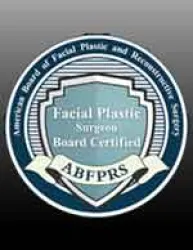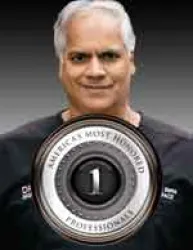Dr. Sinha has special training in delicate surgeries of the face and neck.
Facelifts are one of the most popular forms of cosmetic surgery performed today. They provide both men and women with an extremely effective way to combat the common signs of aging on the face.
Are you a good candidate for a facelift?
As we get older, our skin begins to sag and this can be a very undesirable thing to many people, especially when it starts affecting the appearance of their face. A facelift combats this by pulling the skin upwards and therefore eliminating the sagging areas around the cheeks, eyes, mouth and neck.
Although a facelift is a very effective form of facial surgery, not everybody is a suitable candidate. A person who is a good candidate for atlanta facelift surgery will -
- Not be excessively overweight
In order to quality for facelift surgery, you don't have to be in incredible physical shape but you should not be excessively overweight either. Those who are overweight are at more risk of complications. Also when a patient is excessively overweight, there is a good deal of fat and excess skin around the face and neck that wouldn't otherwise be there and therefore the results of the surgery can suffer.
- Have good skin elasticity
Those with good skin elasticity are ideal candidates for facelift surgery. This is because during the procedure the skin is pulled upwards and those with more skin elasticity will get the best and most natural looking results.
- Be in good physical condition
In addition to being at a healthy weight, good candidates for facelift surgery should also be of free of any serious medical conditions that might cause complications or hinder the recovery process.
- Not be a heavy smoker
Those who are heavy smokers are at more risk during general anaesthetic. For this reason, those who do smoke heavily will be asked to stop for at least 2 months prior to surgery.
- Have good bone structure and facial features
Those with a good bone structure and strong facial features can expect the best results but it's not an absolute must in order to get a facelift. This is because dermal fillers can be used on those with weaker features to add necessary volume and provide a more natural look.
What To Expect During Facelift Surgery?
A facelift can be a life changing procedure if performed properly.
There are many doctors in atlanta performing facelift procedures. However, only a few have the combination of art and science to achieve a truly excellent result. If you're seriously considering Facelift Surgery then you're likely very curious about exactly what to expect. Many people are understandably nervous when it comes to getting cosmetic surgery, especially on their face. The truth is however that surgery is typically very safe and there are rarely any serious complications.
When you have a consultation for facelift surgery, Dr. Sinha will explain everything in detail and also make a full assessment as to whether you are a good candidate or not.
There are many options for a modern facelift…
There are a few types of facelifts that can be performed, and which you opt for will depend on the results you want to achieve. facelift surgery is very often combined with neck lift surgery, liposuction and the use of fat injections, to help achieve the best results possible.
Below are the main types of facelift procedure and how they're performed -
- Facelift
A facelift procedure is performed under general anesthesia and a number of techniques can be used in order to get the desired results. Typically incisions are made in discreet areas, such as at the hairline, behind the ears and underneath the chin so the skin can be pulled upwards to eliminate sagging areas.
- Neck lift (lower facelift)
A neck lift, sometimes known as a 'lower facelift', is used to eliminate lose and sagging skin around the neck while also providing a more prominent jawline. A neck lift is often combined with a facelift as well as other forms of cosmetic treatment such as chin liposuction and blepharoplasty.
- Mid facelift
Mid facelifts are used to restore a youthful look to the middle part of the face. They are performed under general anesthesia and can be performed endoscopically, where a small incision is made at the temple and on in the inside of the mouth so the facial fat pad can be elevated to achieve a more youthful look.
Dr Sinha has performed countless facelift and neck lift procedures on patients from all walks of life. He is double board certified and specializes in face and neck procedures so you can be assured of the best results.
Face and neck surgeries are performed in an accredited and licensed surgical center next door to our office.
Get in touch if you'd like more information on facelift or neck lift surgery.
Recovery And Post Op
A great facelift result depends on a smooth recovery.
Following a facelift surgery, you'll need to follow Dr. Sinha's post op recovery advice in order for the healing process to go smoothly. Once the surgery is finished, the incisions on your face will be bandaged and some swelling is completely normal.
You will usually have a follow-up appointment with your surgeon the day after your facelift surgery so they can check that everything is healing as it should be and there are no unexpected problems. In the following days your stitches will be removed and you will be advised by your surgeon when it's OK for you to resume daily activities, such as washing your hair, doing exercise and returning to work.
Post op advice - secrets to a great surgical result
Immediately after facelift surgery
Once the procedure has been completed, your surgeon may apply a large bandage around your face to reduce swelling and you might have a drainage tube inserted through an incision behind the ear. The drainage tube removes excess fluid and prevents blood from collecting underneath the skin.
In the hours after having a facelift procedure, you will have some pain and discomfort and some swelling and bruising around the incision sites. Pain relief will be administered by your surgeon in order to keep discomfort to a minimum and the pain will decrease over the next few days.
Try to keep the head elevated and still in the days after surgery as this will help to minimize swelling and will prevent any stiches being pulled out.
During the first week of recovery
The first day after surgery is the day you are likely to feel the most pain and discomfort. This is because the body will have started its healing process and the skin on your face will feel tender.
As well as pain killers being provided for the first few days of your recovery, your surgeon could also prescribe a dose of antibiotics to drastically reduce your chance of getting an infection.
Your surgeon will come and visit you around 24 hours post-surgery to check on you and make sure everything has gone well with the procedure. They will also supply you with a recovery plan that's tailored specifically to your needs. This will outline what to avoid during recovery, how to ensure you heal correctly and any problems to look out for.
All heavy lifting and strenuous movement should be avoided and you should try to get plenty of rest. Sleeping improves healing so being well rested will decrease your recovery time.
Usually, stitches are removed between five and seven days after surgery and the results of your facelift procedure will start to become visible.
Two weeks post-surgery
Although the procedure only consists of a small amount of incisions, adequate healing time is still needed in order to allow your body to heal properly. This is because, during the recovery period, you may experience swelling, tightness of the skin, numbness and bruising in the first two weeks post-surgery.
For a minimum of two weeks after having the procedure carried out, any dressings that have been applied to the incision sites should be kept dry and showering should be avoided unless approved by your surgeon.
Pain and discomfort should have subsided and swelling should have diminished completely.
In most cases, patients that have undergone a full facelift procedure can return to work and continue with daily life within two weeks. Some slight bruising may still be visible, however, the results of your surgery will clearly be visible.
Below are some basic pieces of post op advice to follow after a facelift surgery-
Sleep and rest with your head elevated
Keeping your head elevated will help with the healing process and also ensure that your incisions are not exposed to friction.
Take prescribed pain medication
Your surgeon will provide you with pain medication to take following your facelift. The level of pain experienced will vary from one patient to the next so how often you need to take the medication will depend on your own tolerance of the pain.
Avoid any pressure or friction on your incisions
Your incisions will take a while to heal and during this team you should avoid anything that will expose them to pressure or friction. This means it's usually better to avoid any potential rowdy social gatherings where drinking will be involved for the first few weeks after surgery. You should also avoid wearing any tight or restrictive head wear, such as baseball caps.
Wear clothing that doesn't need to be put on over your head
When your incisions are still healing, you should try to avoid wearing any clothes with a tight neckline that need to be put on over your head, such as turtle-neck sweaters. Shirts, blouses, hoodies and cardigans are preferable during this time.
Rare side effects - Contact your surgeon immediately
Shortness of breath
Chest pain
Pain down one side of your face or neck
If you experience any of these side effects then you should contact our team immediately.
Choosing a great facelift surgeon
When you're planning to get a facelift, the most important decision you have to make is which facelift surgeon you're going to choose to perform the surgery. Choosing the right surgeon can very easily be the difference between you being delighted with the results, or wishing you never had it done.
This being the case, you need to know what steps you should take in order to ensure you choose correctly. Below are some of the key steps you should take -
Meet with the surgeon
Before making a final decision about the facelift surgeon you're going to choose to perform your facelift, you should always meet with them first. This is important since it will give you a chance to have any of your questions answered and also to view their surgery. You want to be completely comfortable with the surgeon who's performing your procedure and have full faith that they'll be able to achieve the results you desire.Do your research
You should also do as much research as you can about the surgeons you're considering. Find out where they trained, how long they've been practicing cosmetic surgery and ideally, you'd be able to speak with other patients they've operated on.Questions to ask
Undergoing cosmetic surgery is a big decision so you should never be afraid to ask questions. Below are some important questions to ask any potential surgeonsWhat are you qualifications?
This is very important. You should find out what qualifications and certifications any surgeons you're considering have. This will give you an idea of the level of training they've received and what level of skill they're operating at.How many facelifts have you performed?
This is another key question to ask. Experience is key when it comes to cosmetic surgery since it will allow for the best results and also mean the surgeon is equipped to deal with problems or complications if they arise.
4 Qualities of an Outstanding Facelift Surgeon
Beyond the surgeon's talent, training and rapport with you, what you consider "the best" will eventually hinge on your individual personality, needs and expectations.
While varying factors may influence your opinion of what makes a surgeon the best choice for you, there are some broad characteristics that distinguish a great facelift surgeon from a good one. You can use these criteria to help you as you begin to do your research and narrow down your options.
1. Expertise with the Face
Because the musculature and bone structure of the face is so complex, facial cosmetic surgery requires an exceptionally high degree of technical skill - perhaps even more so than other areas of cosmetic surgery. There are many different specialties and sub-specialties in cosmetic surgery, and not all plastic surgeons have chosen to focus on facelifts, so make sure you look for a doctor who has devoted at least part of his or her practice to facelift procedures.
Schedule an in-person appointment with each surgeon you are evaluating. During this meeting, observe the surgeon's ability to assess your facial features and to develop a comprehensive treatment plan that is tailored to helping you achieve your specific needs and goals.
Depending on your facial features and desired results, a facelift might not even be the best option available to you. There are many modern facial rejuvenation procedures to explore, and an experienced plastic surgeon will be able to explain all your options and help you decide the best course of action for you.
A surgeon whose practice offers a wider range of treatments can help you determine whether a surgical procedure is right for you, or whether you may be a better candidate for minimally invasive treatments such as Botox or injectable dermal fillers.
Whether you want more defined cheekbones or firmer skin, make sure to be honest with your cosmetic surgeon about all your goals and concerns for the procedure. It's perfectly OK to ask plenty of questions to learn more about each surgeon's approach and philosophy and find out how they align with yours.
Some example questions to ask your potential plastic surgeon are:
● What treatment options are available for me?
● What results should I realistically be able to expect?
● How long have you been practicing aesthetic surgery?
● How many facelift procedures have you performed?
● What facelift techniques do you use?
● Are you board-certified?
2. An Artist's Eye
What one person considers to be a beautiful, well-proportioned face might not be attractive to another. That's why you should ensure you and your chosen surgeon are on the same page when it comes to what constitutes successful surgical outcomes.
Cosmetic surgery is a balance between science and art. Make sure the surgeon of your choice has an aesthetic philosophy that aligns with yours when it comes to factors such as facial contours, harmony and symmetry. A surgeon who consistently delivers outstanding facelift outcomes should not only have a deep understanding of facial anatomy, but also a highly developed artistic sensibility.
Ask your plastic surgeon if you can see before-and-after photos of his or her previous work. In particular, look for patients who are about the same age as you are and have a similar bone structure and face shape. Facelift results should never have a pulled, "windblown" look. Instead, they should have a delicate and totally natural appearance.
3. Honesty and Integrity
When making treatment recommendations, your surgeon should prioritize your overall needs and well-being above all else. You should be able to build a level of trust in your surgeon as a partner, not just a service provider or, worse yet, a cosmetic procedure salesperson.
Find a surgeon who takes time to talk through your goals and to explain what choices are available to you. You should walk away from your consultation appointment having received a detailed explanation of the procedure, including costs, what results you can expect and what your recovery time and possible risks will be. You should also be informed about alternate treatments to consider, along with their pros and cons.
As your trusted aesthetic partner, your plastic surgeon should:
● Be friendly, respectful and honest.
● Be a good listener who appreciates your concerns and needs.
● Set and manage realistic expectations.
● Encourage an open, two-way dialogue.
● Discuss the procedure in language you can understand, not with technical terms that go over your head.
By the same token, you should be cautious of plastic surgeons who:
● Seem reluctant to discuss the possible risks and complications with you.
● Are not up-front when it comes to discussing the costs and fees involved.
● Put you under pressure to make a decision, or use language that feels overly "sales-y."
● Answer your questions vaguely or ambiguously.
● Promise that they offer "the best" facelift technique.
4. A Proven Track Record of Success
Before undergoing surgery, it's essential to ensure your surgeon is reputable and has a flawless record of performing successful facelifts. Here are some of the things you can do to assess your surgeon's reputation:
● Make sure the surgeon has received at least one board certification.
● See if the doctor maintains memberships in professional medical organization.
● Check with the state medical board to ensure no former patients have taken any disciplinary action against the plastic surgeon.
● Ask the doctor to provide referrals from previous patients.
● Ask if the doctor has won any awards or accolades.
Dr Sinha is a double board certified surgeon who specializes in face and neck surgery. He has helped countless patients to achieve a more youthful look and get their confidence back.






















